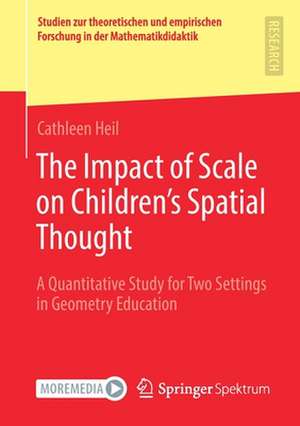The Impact of Scale on Children’s Spatial Thought: A Quantitative Study for Two Settings in Geometry Education: Studien zur theoretischen und empirischen Forschung in der Mathematikdidaktik
Autor Cathleen Heilen Limba Engleză Paperback – 23 feb 2021
In this book, Cathleen Heil addresses the question of how to conceptually understand children’s spatial thought in the context of geometry education. She proposes that in order to help children develop their abilities to successfully grasp and manipulate the spatial relations they experience in their everyday lives, spatial thought should not only be addressed in written or tabletop settings at school. Instead, geometry education should also focus on settings involving real space, such as during reasoning with maps.
In a first part of this book, she theoretically addresses the construct of spatial thought at different scales of space from a cognitive psychological point of view and shows that maps can be rich sources for spatial thinking. In a second part, she proposes how to measure children’s spatial thought in a paper-and-pencil setting and map-based setting in real space. In a third, empirical part, she examines the relations between children’s spatialthought in those two settings both at a manifest and latent level.
Din seria Studien zur theoretischen und empirischen Forschung in der Mathematikdidaktik
-
 Preț: 316.48 lei
Preț: 316.48 lei -
 Preț: 382.96 lei
Preț: 382.96 lei - 15%
 Preț: 452.62 lei
Preț: 452.62 lei -
 Preț: 455.71 lei
Preț: 455.71 lei -
 Preț: 456.10 lei
Preț: 456.10 lei -
 Preț: 454.53 lei
Preț: 454.53 lei -
 Preț: 459.38 lei
Preț: 459.38 lei -
 Preț: 420.58 lei
Preț: 420.58 lei -
 Preț: 417.90 lei
Preț: 417.90 lei -
 Preț: 449.53 lei
Preț: 449.53 lei -
 Preț: 454.16 lei
Preț: 454.16 lei -
 Preț: 453.60 lei
Preț: 453.60 lei -
 Preț: 488.71 lei
Preț: 488.71 lei - 15%
 Preț: 451.64 lei
Preț: 451.64 lei -
 Preț: 459.75 lei
Preț: 459.75 lei -
 Preț: 489.48 lei
Preț: 489.48 lei - 15%
 Preț: 448.39 lei
Preț: 448.39 lei -
 Preț: 426.94 lei
Preț: 426.94 lei -
 Preț: 450.88 lei
Preț: 450.88 lei -
 Preț: 420.58 lei
Preț: 420.58 lei -
 Preț: 421.72 lei
Preț: 421.72 lei -
 Preț: 454.16 lei
Preț: 454.16 lei -
 Preț: 457.62 lei
Preț: 457.62 lei -
 Preț: 420.97 lei
Preț: 420.97 lei
Preț: 395.25 lei
Nou
Puncte Express: 593
Preț estimativ în valută:
75.63€ • 79.25$ • 62.52£
75.63€ • 79.25$ • 62.52£
Carte tipărită la comandă
Livrare economică 11-25 aprilie
Preluare comenzi: 021 569.72.76
Specificații
ISBN-13: 9783658326470
ISBN-10: 3658326476
Pagini: 464
Ilustrații: XXVII, 464 p. 107 illus.
Dimensiuni: 148 x 210 mm
Greutate: 0.59 kg
Ediția:1st ed. 2020
Editura: Springer Fachmedien Wiesbaden
Colecția Springer Spektrum
Seria Studien zur theoretischen und empirischen Forschung in der Mathematikdidaktik
Locul publicării:Wiesbaden, Germany
ISBN-10: 3658326476
Pagini: 464
Ilustrații: XXVII, 464 p. 107 illus.
Dimensiuni: 148 x 210 mm
Greutate: 0.59 kg
Ediția:1st ed. 2020
Editura: Springer Fachmedien Wiesbaden
Colecția Springer Spektrum
Seria Studien zur theoretischen und empirischen Forschung in der Mathematikdidaktik
Locul publicării:Wiesbaden, Germany
Cuprins
Introduction.- Conceptualizing Spatial Cognition.- Understanding Spatial Abilities at Different Scales of Space.- Reviewing Empirical Findings of Spatial Abilities at Different Scales of Space.- Design of the Empirical Study.- Testing Material for Small-Scale Spatial Abilities.- Testing Material for Large-Scale Spatial Abilities.- Additional Testing Material.- Data Collection.- Children’s Small-Scale Spatial Abilities.- Children’s Large-Scale Spatial Abilities.- Relations Between Children’s Small-Scale and Large-Scale Spatial Abilities.- Discussion, Limitations, and Implications.- Conclusion.
Recenzii
“This book would be of importance to researchers who are interested in the area of spatial thinking especially as it relates to children. The empirical study described in the book would also provide important information to those who are interested in geometry education in schools.” (Mary Beth Rollick, MAA Reviews, May 9, 2021)
Notă biografică
Cathleen Heil is a research assistant at the Institute of Mathematics and its Didactics at Leuphana University Lüneburg. She received her PhD under supervision of Prof. Dr. Silke Ruwisch. She is currently a fellow of Deutsche Telekom Stiftung, examining how learning environments involving maps may improve children‘s spatial thought in geometry education.
Textul de pe ultima copertă
In this book, Cathleen Heil addresses the question of how to conceptually understand children’s spatial thought in the context of geometry education. She proposes that in order to help children develop their abilities to successfully grasp and manipulate the spatial relations they experience in their everyday lives, spatial thought should not only be addressed in written or tabletop settings at school. Instead, geometry education should also focus on settings involving real space, such as during reasoning with maps.
In a first part of this book, she theoretically addresses the construct of spatial thought at different scales of space from a cognitive psychological point of view and shows that maps can be rich sources for spatial thinking. In a second part, she proposes how to measure children’s spatial thought in a paper-and-pencil setting and map-based setting in real space. In a third, empirical part, she examines the relations between children’s spatial thought in those two settings both at a manifest and latent level.
About the author
Cathleen Heil is a research assistant at the Institute of Mathematics and its Didactics at Leuphana University Lüneburg. She received her PhD under supervision of Prof. Dr. Silke Ruwisch. She is currently a fellow of Deutsche Telekom Stiftung, examining how learning environments involving maps may improve children‘s spatial thought in geometry education.
